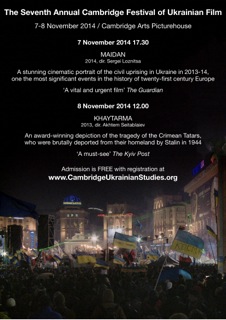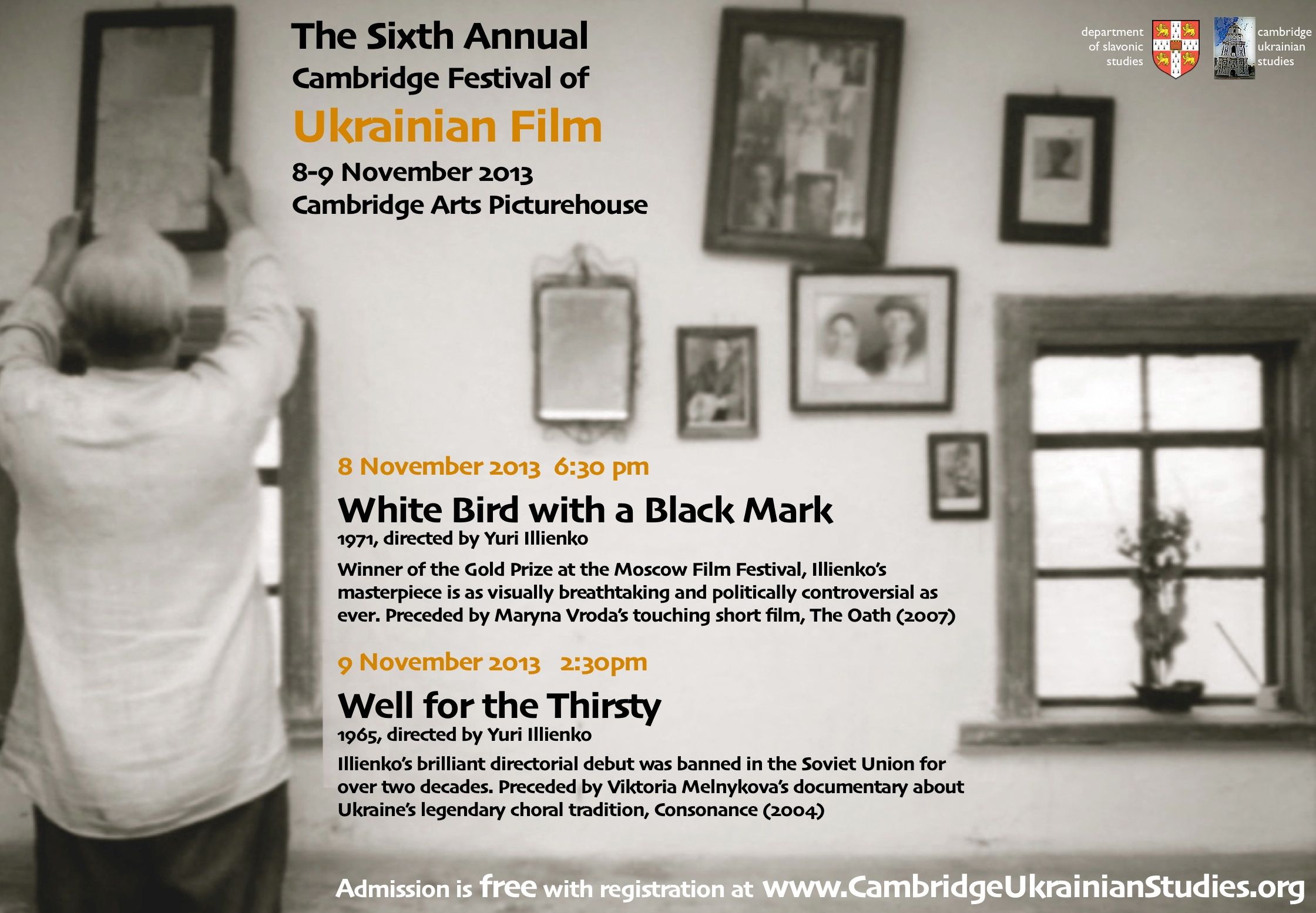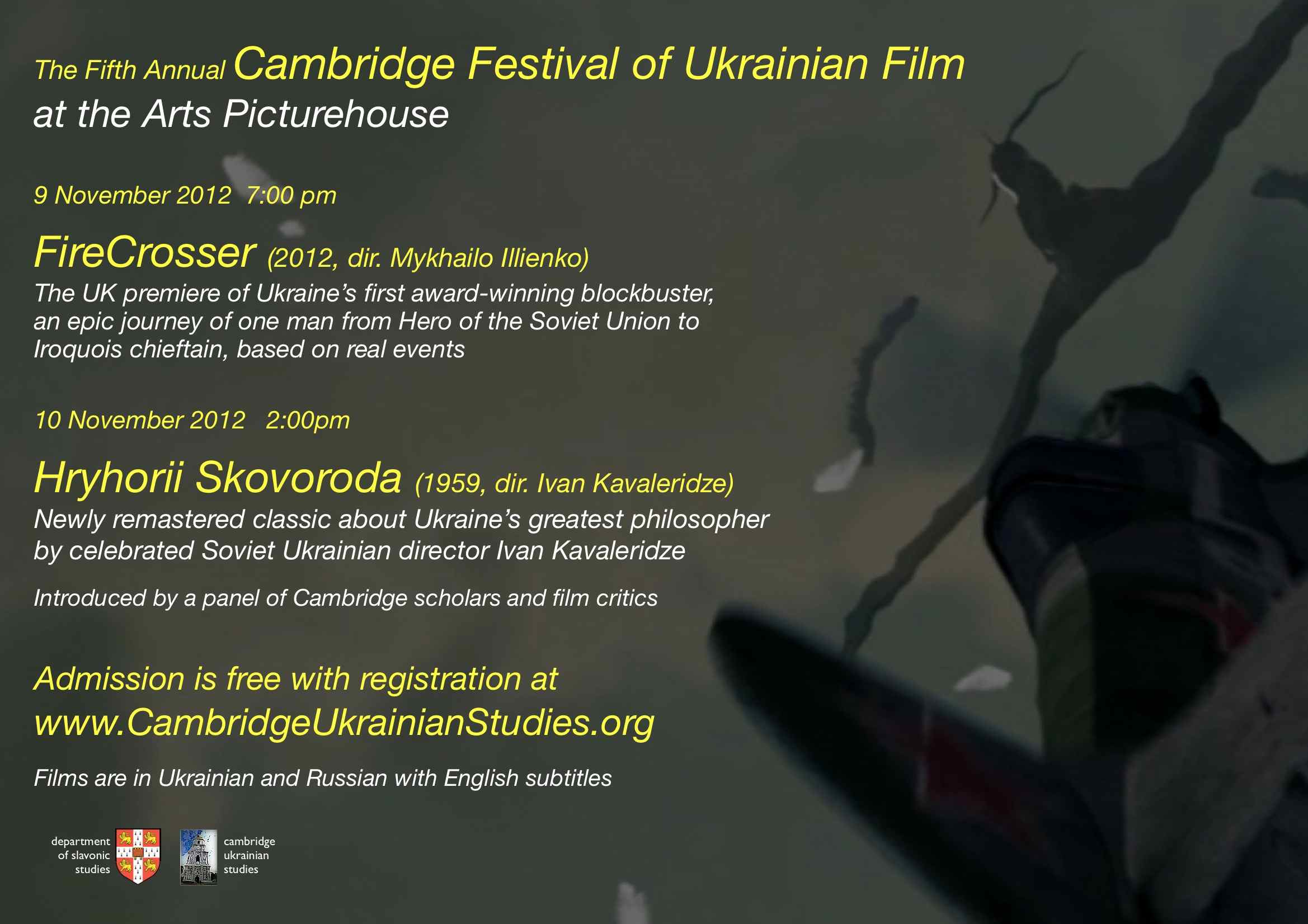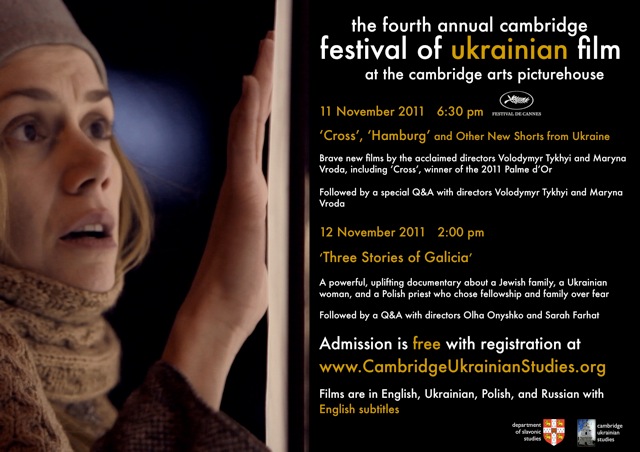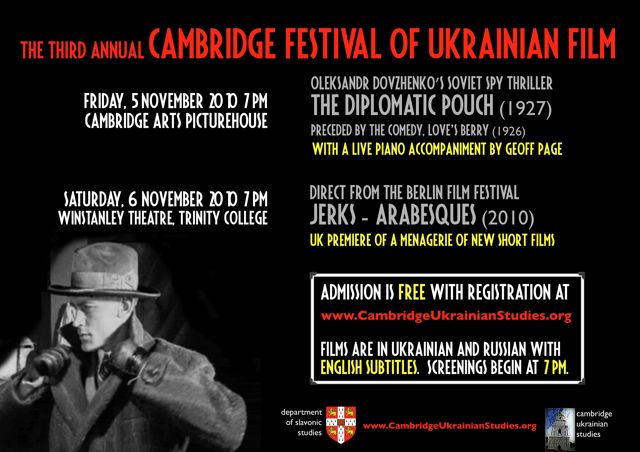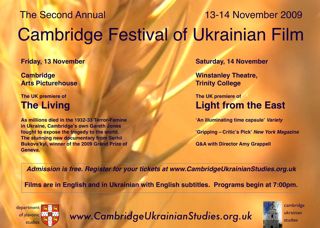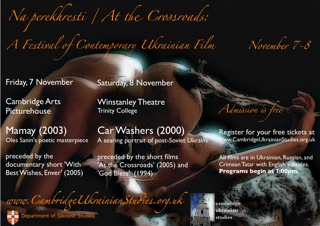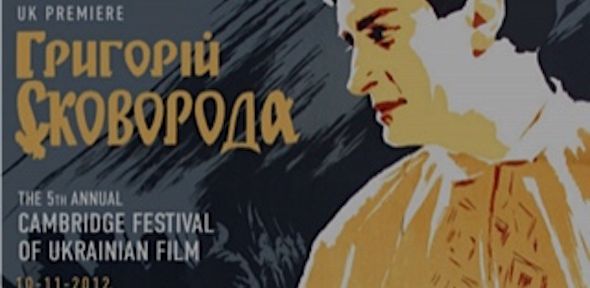
Since 2008, Cambridge Ukrainian Studies has organised and hosted an annual film festival featuring the best of Ukrainian cinema from its beginnings to the present day. It has also welcomed contemporary filmmakers, film scholars, preservationists and musicians to engage with diverse audiences and offer fresh perspectives into material old and new.
The Fifteenth Annual Cambridge Festival of Ukrainian Film
The Fifteenth Annual Cambridge Festival of Ukrainian Film celebrated the defiant independence of Ukrainian culture and marked 100 years since the establishment of VUFKU — the All-Ukrainian Photo-Film Administration — with a series of public events and fundraising screenings in support of humanitarian relief in Ukraine. The headline event was a walk-through screening of three VUFKU films at Cambridge's Museum of Technology.
The Fourteenth Annual Cambridge Festival of Ukrainian Film

From 22 November to 6 December 2021, Cambridge Ukrainian Studies and the Ukrainian Institute London welcomed audiences to the 2021 Ukrainian Film Festival, Freedom on Screen. Showcasing a dynamic and diverse selection of documentary and feature films, the event marked 30 years of Ukraine’s independent statehood by celebrating a spirit of creative freedom in contemporary Ukrainian cinema.
The festival programme featured a combination of online and in-person screenings: our digital cinema offered you a curated collection of contemporary Ukrainian films to watch at your leisure anywhere in the UK, while our select in-person screenings and Q&As took place in cinemas and galleries in London and Cambridge. In Cambridge, we hosted the UK premiere of the film Ivan's Land at the historic museum Kettle's Yard. Read up on the life and work of the film's subject, the folk painter Ivan Prykhodko, in this short brochure by Rory Finnin.
The Thirteenth Annual Cambridge Festival of Ukrainian Film
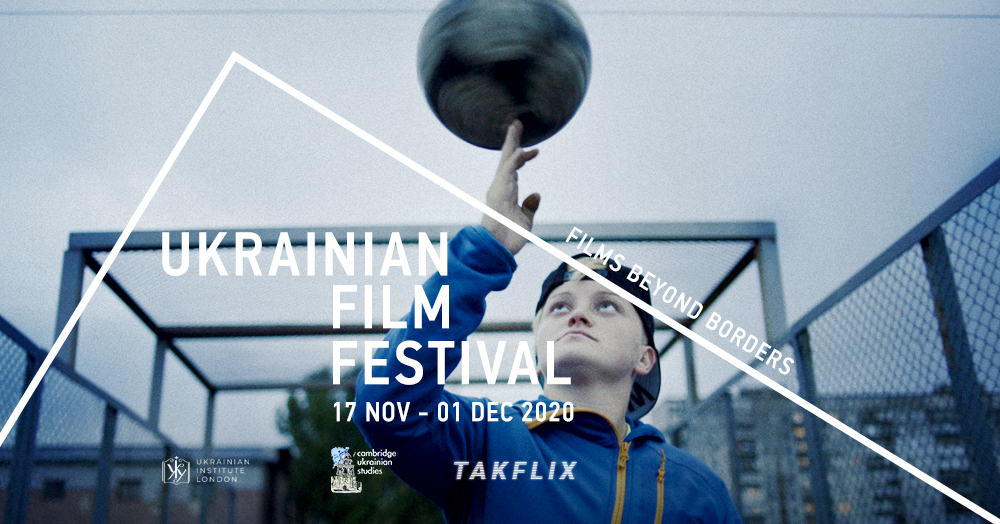
As Covid-19 lockdowns took place across the globe, Cambridge Ukrainian Studies and the Ukrainian Institute London joined forces to host an online festival of Ukrainian films, showcasing four gripping contemporary Ukrainian films and holding online Q&As with the directors.
The Twelfth Annual Cambridge Festival of Ukrainian Film
In 2019 Cambridge Ukrainian Studies collaborated with Cambridge Polish Studies, the Holodomor Research and Education Consortium, and the Association of Ukrainians in Great Britain to screen the 2019 film Mr. Jones, directed by Agnieszka Holland and starring James Norton, Vanessa Kirby and Peter Sarsgaard.
The film is based on the life of Gareth Jones, the Cambridge graduate who was the only journalist to stake his name and reputation in reporting on the horrors of the Holodomor, Stalin's genocidal famine of 1932-33.
In 2009 Cambridge Ukrainian Studies organised an exhibition of the 1932-33 diaries of Gareth Jones, which garnered international media attention and sought to "share Gareth's story with the world."
The Eleventh Annual Cambridge Festival of Ukrainian Film
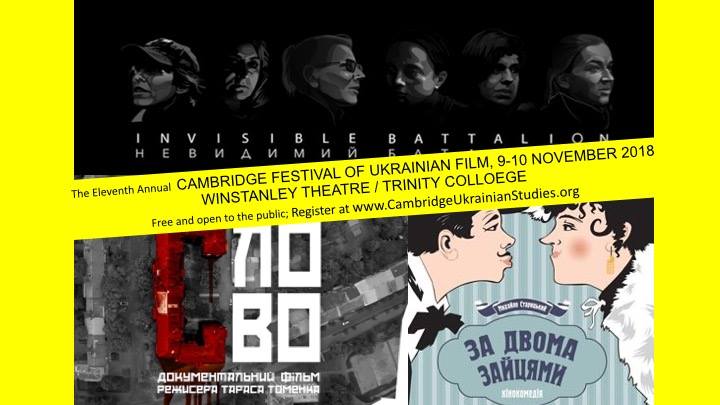
In its eleventh year, the Cambridge Festival of Ukrainian Film featured Invisible Battalion (2017), the first full-length Ukrainian documentary about women at war produced and filmed by women. It also screened the beloved Soviet classic comedy Chasing Two Hares (Za dvoma zaitsamy, 1961) in its original Ukrainian-language version as well as the captivating 2017 documentary ‘Slovo’ House (Budynok ‘Slovo’, 2017), which told the stories of the flamboyant generation of artists, writers, and intellectuals in 1920s Ukraine.
The Tenth Annual Cambridge Festival of Ukrainian Film
In 2017 Cambridge Ukrainian Studies partnered with the Docudays UA International Documentary Human Rights Film Festival, Avantis Promotions, and the Oleksandr Dovzhenko National Centre to screen a selection of new documentaries from Ukraine by Svitlana Shymko and Roman Bondarchuk as well as Oleksandr Dovzhenko's remastered classic about the revolutionary events of 1917-18, Arsenal. The new Cambridge Ukrainian Studies booklet Navigating Arsenal was also distributed to audience members during the presentation of the film.
The Ninth Annual Cambridge Festival of Ukrainian Film
In 2016 Cambridge Ukrainian Studies partnered with the Docudays UA International Documentary Human Rights Film Festival, the Oleksandr Dovzhenko National Centre and the makers of the 2014 film Hollywood on the Dnipro: Dreams from Atlantis.
Among the films screened were Two Days (1927; dir. H. Stabovyi) and The Night Coachman (1928; dir. H. Tasin), two newly restored Soviet Ukrainian thrillers about men caught in the violent maelstrom of revolution and pushed to the brink by all sides. Produced under the auspices of VUFKU, the famous All-Ukrainian Photo-Film Administration, the films are notable for their complex presentation of revolution devoid of triumphalism and filtered through the experience of the individual.
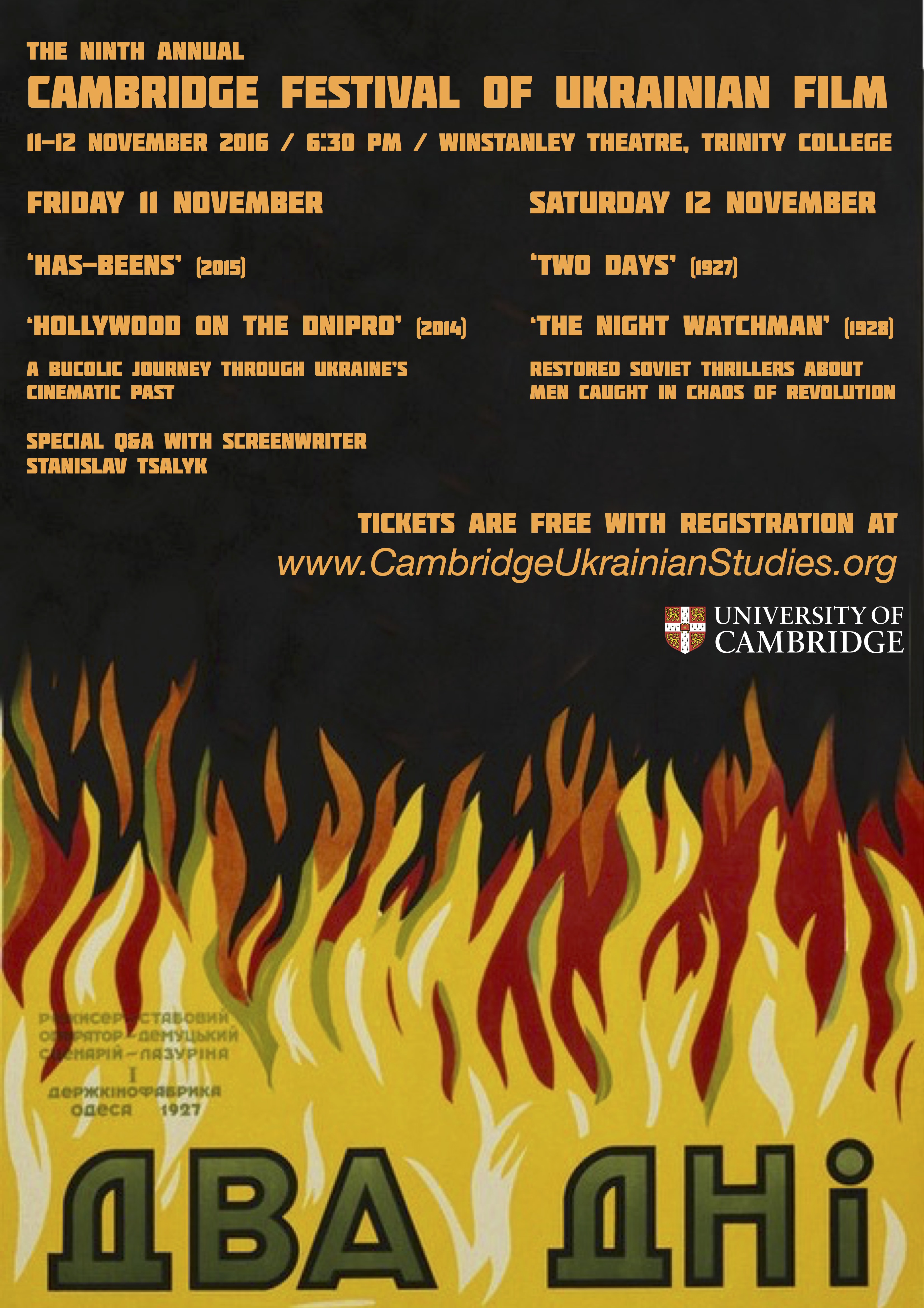
The Eighth Annual Cambridge Festival of Ukrainian Film
In 2015 Cambridge Ukrainian Studies partnered with the Docudays UA International Documentary Human Rights Film Festival to bring six powerful new documentaries to local audiences. DocuDays UA was launched in Kyiv in 2003 as a non-profit organisation dedicated to the development of documentary cinema and to the flourishing of democratic civil society in Ukraine.
Many of the films in the Festival programme confronted the tumult of revolution and war in today’s Ukraine with an uncommon honesty, sensitivity and maturity. They availed the viewer of the perspectives of the volunteer doctor, the wounded veteran, the soldier preparing to leave home for war. Other films in the programme meditated upon the passing of generations in a Ukraine very far from today’s headlines: the village and countryside.
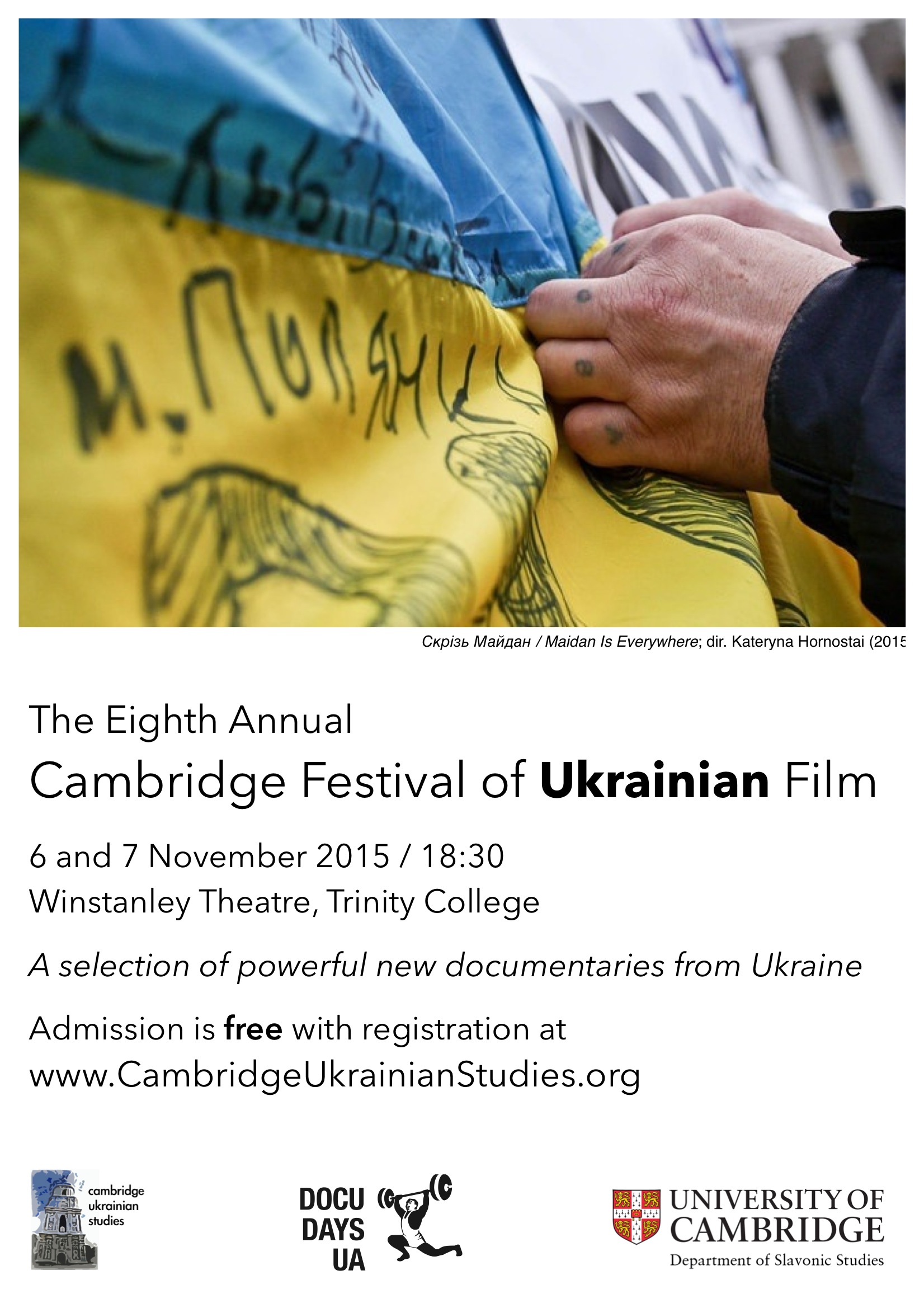
The Seventh Annual Cambridge Festival of Ukrainian Film
In 2014 the Cambridge Festival of Ukrainian Film was headlined by two celebrated new films with critical significance for an understanding of contemporary Ukraine: Sergei Loznitsa's Maidan (2014) and Akhtem Seitablaiev's Khaytarma (2013). Maidan is a stunning cinematic portrait of the 2013-14 public uprising in Kyiv, one the most significant events in the history of twenty-first century Europe. Khaytarma depicts Stalin's 1944 deportation of Crimean Tatars, an ordeal of mass death and brutal dispossession that claimed the lives of at least thirty percent of the entire Crimean Tatar population.
The Sixth Annual Cambridge Festival of Ukrainian Film
In 2013 Cambridge Ukrainian Studies celebrated the films of late director Yuri Illienko, including White Bird with a Black Mark (1970), which won the Gold Prize at the Moscow Film Festival, and Well for the Thirsty (1965), which was banned in the Soviet Union for over two decades. The festival also featured Maryna Vroda's touching short film, The Oath (2007), and Viktoria Melnykova's documentary about Ukraine's legendary choral tradition, Consonance (2004).
The Fifth Annual Cambridge Festival of Ukrainian Film
In 2012 Cambridge Ukrainian Studies partnered with the Dovzhenko Centre (Kyiv) to bring to Cambridge two UK premieres: Mykhailo Illienko's blockbuster FireCrosser (2012) and Ivan Kavaleridze's remastered classic Hryhorii Skovoroda (1959). The screening of Hryhorii Skovoroda, held in celebration of the 125th anniversary of Kavaleridze's birth, was introduced by a panel of Cambridge scholars and film critics.
The Fourth Annual Cambridge Festival of Ukrainian Film
In 2011 the Annual Cambridge Festival of Ukrainian Film was headlined by short films by Volodymyr Tykhyi, Maryna Vroda, and other young, critically-acclaimed directors charging new artistic, social, and political horizons. These films, screened on Friday, 11 November, were followed by a special Q&A with directors Tykhyi and Vroda, whose 'Cross' won the 2011 Palme d'Or at Cannes. On Saturday, 12 November, we were proud to present the British premiere of 'Three Stories of Galicia', a new documentary about fellowship and family in a region gripped by Hitler and Stalin. The film was also followed by a special Q&A with directors Olha Onyshko and Sarah Farhat.
The Third Annual Cambridge Festival of Ukrainian Film
In 2010 the Annual Cambridge Festival of Ukrainian Film was headlined by Oleksandr Dovzhenko's silent Soviet spy thriller The Diplomatic Pouch (Sumka dypkur'iera, 1927) and his comedy Love's Berry (Iahodka kokhannia, 1926). These films, screened on Friday, 5 November at the Cambridge Arts Picturehouse, were accompanied by a special live piano performance from Geoff Page. On Saturday, 6 November at the Winstanley Theatre, Trinity College, Cambridge Ukrainian Studies proudly presented the UK premiere of a series of brilliant new short films from Ukraine, Jerks -- Arabesques (Mudaky - Arabesky, 2010), in coordination with the Ukrainian Film Club of Columbia University.
The Second Annual Cambridge Festival of Ukrainian Film
Featuring two British premieres as well as a selection of short films, the Second Annual Cambridge Festival of Ukrainian Film was headlined by Serhii Bukovs'kyi's The Living (2008), recipient of the 2009 Grand Prize of Geneva and the 2009 Award for Best Documentary from the Yerevan International Film Festival. Its second night featured the screening of Light from the East (2006/2008) -- praised by Variety as 'an illuminating time capsule' and by New Yorkmagazine as 'a gripping documentary' -- followed by a special discussion with director Amy Grappell.
The First Annual Cambridge Festival of Ukrainian Film
Titled 'At the Crossroads' (Na perekhresti), the First Annual Cambridge Festival of Ukrainian Film introduced audiences to new currents in Ukrainian cinema and explored themes of border-crossing in Ukrainian society. The films screened on its first night -- headlined by Oles' Sanin's Mamai (2003) -- considered the historical crossing of cultural, ethnic, and religious borders within Ukraine, particularly on the Crimean peninsula and the Ukrainian steppe. The films screened on its second night -- headlined by Volodymyr Tykhyi's Car Washers (2000) -- considered the contemporary crossing of economic, geographic, and generational borders in post-Soviet Ukraine and beyond.


